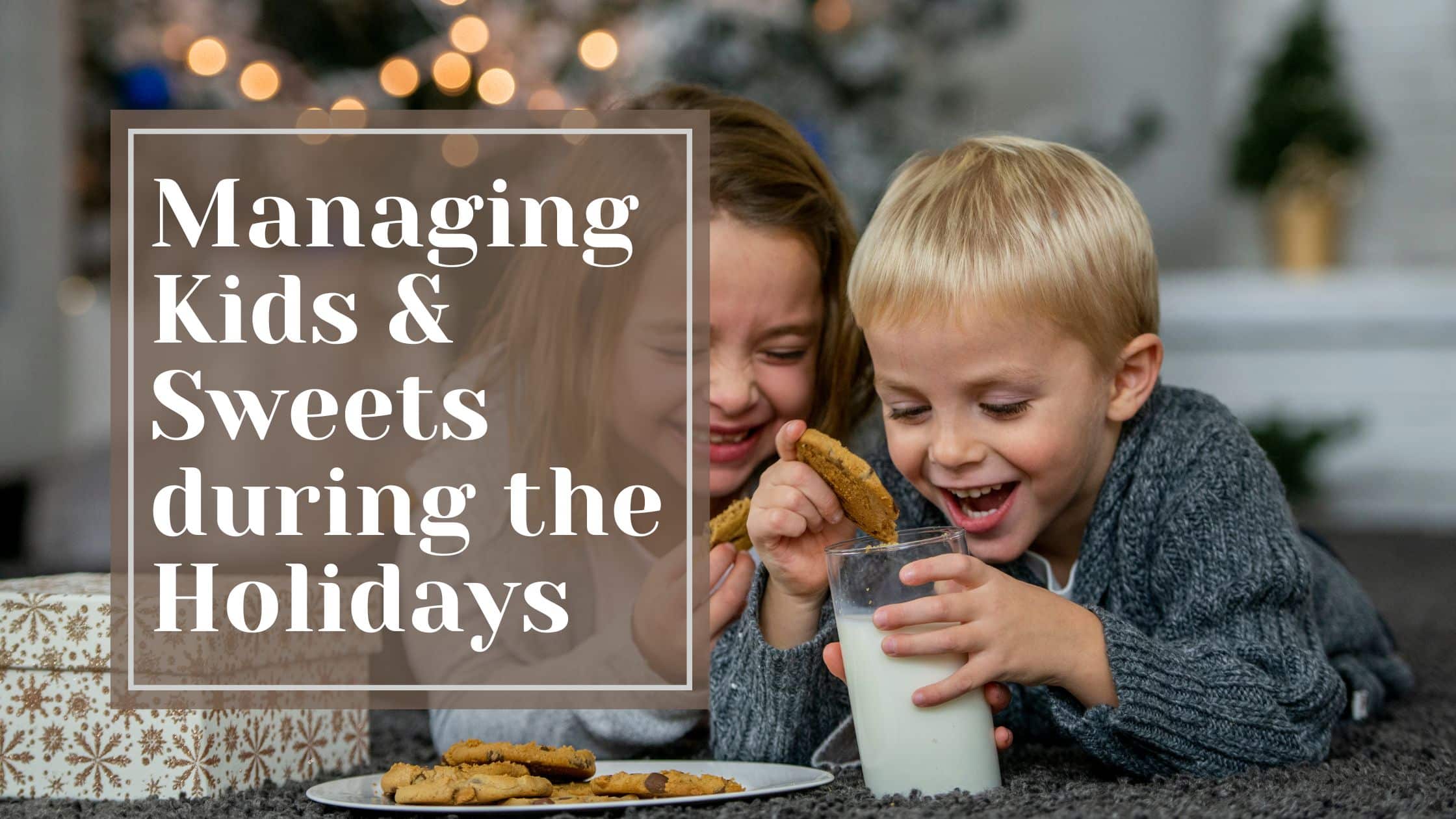
Managing Kids and Sweets at Holiday Parties
Struggling managing kids and sweets at holiday parties? Learn why restrictive food rules can backfire and how to create a balanced, stress-free approach. Discover tips from a dietitian for managing sugary treats, handling relatives’ comments, and fostering a healthy relationship with food—all while keeping the holiday fun intact!
Watching parents and their children eating at holiday parties is interesting. I overhear a lot of:
“Only two treats!”
“Eat your dinner first.”
“You’re going to bounce off the walls with all that sugar!”
Parents are anxious. And the child’s look of excitement quickly changes to disappointment or anger. And there goes the fun out of the party….
Here’s my challenge to you at holiday parties: if your kid is older than a toddler – let them take whatever they want off the buffet table. And don’t make a comment.
Your child has other opportunities during the day and the week to eat their fruits, vegetables, and protein. And when they get home, you can offer them a nutritious bedtime snack.
This is the best way to make desserts less “special” and restricted. And therefore, less interesting. I know allowing your child unlimited access to sweets at a party may bring up some fears. Here are some common ones:
Parent’s fears around sweets
My child will barf
If your child overindulges, they will be able to link feeling ill to eating a plate full of cookies. And choose less next time! I did this once on chocolates as a child. And two of my kids have done this as well. But it does not become a habit!
It’s a much quicker way to learn that maybe you shouldn’t eat 15 chocolates than your parent telling you that you should not eat 15 chocolates.
Sugar is addictive
This review study on sugar addiction states: We find little evidence to support sugar addiction in humans, and findings from the animal literature suggest that addiction-like behaviours, such as bingeing, occur only in the context of intermittent access to sugar. These behaviours likely arise from intermittent access to sweet-tasting or highly palatable foods, not the neurochemical effects of sugar.
So, binging on food or sugar happens not because your child has unlimited access and is addicted. It happens because your child has limited access—perhaps the exact opposite of what you thought.
Sugar causes hyperactivity
Research has documented that sugar does not cause kids to be hyper. Then why does your child go crazy at parties with lots of sugar?
Their wild behaviour has more to do with the environment than food. They’re surrounded by lots of other kids, having a blast!
It also has to do with parents’ expectations. If parents think sugar causes their children to be hyper, they rate their children as more hyper. Eve after having a placebo drink that did not contain any sugar!
How to handle relatives that make comments on your child’s body or food intake
Another struggle at holiday parties (mostly family gatherings) is comments a relative may make about your child’s food choices or body. Whether others comment on your child eating too much, too little, the wrong thing, weighing too much or too little…how do we handle this?
If it’s a one-off thing, I tend to ignore it at the moment. And if your child is old enough, you can chat with them later: “Why do you think Grandpa wanted so badly for you to clean your plate?”
Perhaps Grandpa grew up with food insecurity and values not wasting food. Maybe it’s habit, as he made his own kids clean their plates. Or maybe he’s worried his grandchild isn’t going to get the nutrition she needs to grow her best.
You could also address the comment at the time by saying something simple like: “We trust her body to grow well” and then redirect the conversation.
Or “We let him listen to his appetite.”
Or “We don’t bribe with sweets.”
Of course, we don’t want family celebrations to turn into a fight. You don’t have to explain yourself. But you can if you choose to, or the family member pushes back and ask why.
And how do you explain your rules (or lack thereof) regarding food? Because “we want her to grow up to have a healthy relationship with food and her body.” Or “because my dietitian said so.”
You can ask this relative why it’s so important to them that your child eat their vegetables before getting dessert. It might encourage some introspection and growth.
Managing kids and sweets long-term
Managing kids and sweets is not just a holiday challenge. Our goal, no matter the time of year, is to neutralize all foods and take the specialness out of sweets so they are no longer a coveted and forbidden food! Here are some tips to do that:
1. Regularly include dessert or sweet foods. You don’t have to offer chips or cookies daily, but it’s ok to have sweets a few times per week. Remember, we’re trying to normalize these foods, and take the ‘uniqueness’ out of them!
2. Don’t bribe with dessert. It should never be a bribe if you serve dessert after a meal. If your child is forced to finish their veggies to get dessert, this is just telling them the veggies must be gross because they require some reward for eating them. And it puts the dessert up on a pedestal. And it’s likely creating a sweet tooth, possibly for life!
3. When you offer dessert, serve it with the meal. Your child can choose to eat the dessert when they like, along with their dinner.
At first, your child may eat all of the dessert first. But when this becomes normal, they will go back and forth between the sweet and savory foods. Dessert becomes no big deal to them anymore, now that it’s no longer the bribe at the end of the meal!
Caveat: Unlike the rest of the foods at the meal (the child chooses how much to eat and can have more if they want), dessert is limited to one portion per person.
4. Offer unlimited cookies (or other baking) for a snack. At other times, you can let your child choose how many sweets to eat. Such as at a party. Or snack time a few times a week, along with some milk or fruit. Once this becomes normal and the child doesn’t feel restricted, they will naturally choose to eat less.
5. Call food what it is: calling it a “treat” or a “sometimes” food automatically makes that food restricted, special and coveted! That is not the intention. Just call the food what it is. Cookie, cake or chocolate!
If you would like to make the holiday season easier, watch this free Summit I participated in: A Season of Ease – Parenting Tools for a Calmer, Happier Holiday with Melissa a coach for highly sensitive families, Sara from Joyful Toddler Parenting and Julianna from Make Better Space.
My takeaways were: do less, buy less and try and let go of some of that control! Watch the free replay here.
Happy Holidays 🎄🕎🎅🏻
Founder of First Step Nutrition | Registered Dietitian Nutritionist
Jen believes raising happy, well-nourished eaters who have a healthy relationship with food doesn't have to be a battle! She is an author and speaker with 18 years of experience specializing in family nutrition and helps parents teach their kids to try new foods without yelling, tricking, or bribing.







No Comments